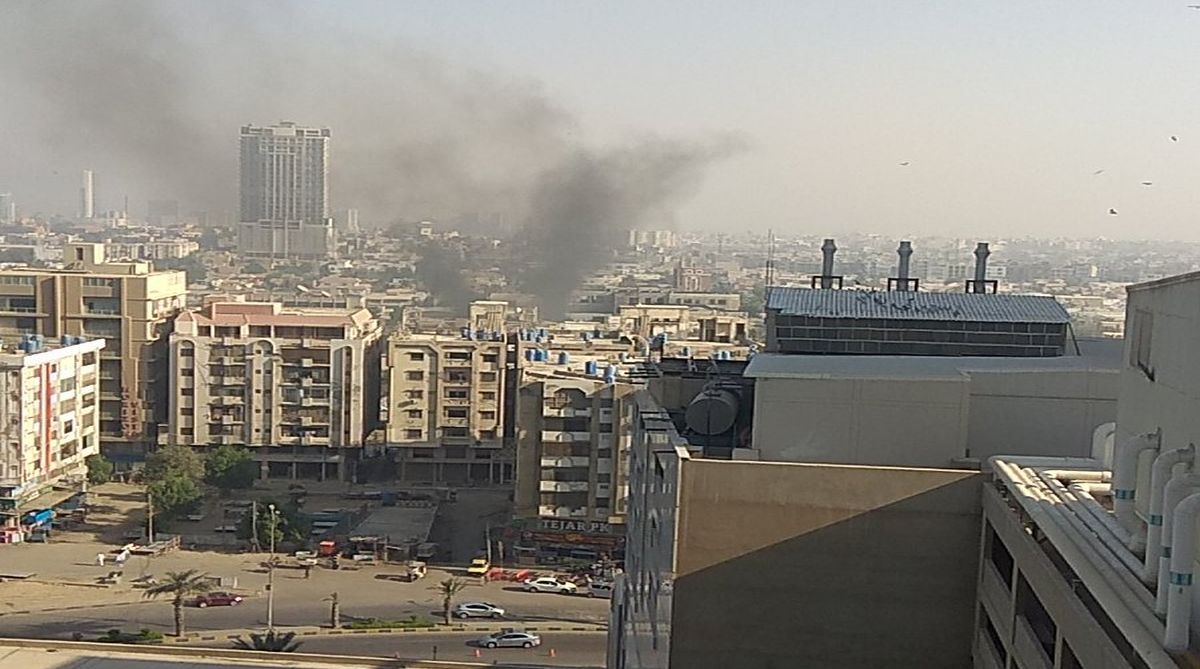We strongly condemn cowardly terrorist attack in New Orleans: PM Modi
Prime Minister Narendra Modi, on Thursday, strongly condemned the "cowardly terrorist attack" in New Orleans that has left at least 15 dead.
According to reports, at least three terrorists were also killed after an exchange of fire with security personnel.

Smoke rises from the Chinese consulate after an attack by gunmen in Karachi. (Photo: Twitter | @talalsid)
At least two policemen were killed when unidentified gunmen stormed the Chinese consulate in the Pakistani port city of Karachi on Friday, officials said.
According to reports, at least three terrorists were also killed after an exchange of fire with security personnel.
Advertisement
Up to four gunmen tried to enter the consulate but were intercepted by security guards at a checkpoint, senior local police official Javaid Alam Odho told AFP.
Advertisement
An exchange of fire resulted “killing two of our constables and critically wounding another”, he said.
He added that the group “ran away” but did not confirm if the attack was over, saying the area had been cordoned off and security forces were conducting a clearing operation.
Chinese Embassy Flag visible on the left pic.twitter.com/dcwjibMtAb
— Talal H Siddiqui (@talalsid) November 23, 2018
Police and Rangers were on the scene, police said. Pictures posted to social media purportedly of the attack showed smoke rising from the area.
Police officers said that the terrorists had come to the consulate in a car laden with explosives.
The attack was claimed by a separatist terrorist group from Pakistan’s southwestern province of Balochistan, which is at the centre of a major Chinese investment project in the country.
“We have carried out this attack and our action is continuing,” the spokesman for the Balochistan Liberation Army (BLA), Geand Baloch, told news agency AFP by telephone from an undisclosed location.
The BLA is just one of the terrorist groups operating in Balochistan, Pakistan’s largest and poorest province, which is rife with ethnic, sectarian and separatist insurgencies.
India has strongly condemned the terrorist attack on the Chinese consulate in Karachi.
“We condole loss of lives in this dastardly attack. There can be no justification whatsoever for any act of terrorism. The perpetrators of this heinous attack should be brought to justice expeditiously,” Ministry of External Affairs said in a statement.
Such terrorist attacks only strengthen the resolve of the international community to combat terrorism in all its forms and manifestations, it added.
India strongly condemns the terrorist attack on the #ChineseConsulate in #Karachi this morning. We condole the loss of lives in this dastardly attack. There can be no justification whatsoever for any act of terrorism. Our press statement at https://t.co/T04YOWrj6Y pic.twitter.com/o9Ed2YfjoB
— Raveesh Kumar (@MEAIndia) November 23, 2018
China, one of Pakistan’s closest allies, has poured billions into the South Asian country in recent years as part of a massive infrastructure project that seeks to connect its western province Xinjiang with the Arabian Sea port of Gwadar.
The project, the so-called ‘China-Pakistan Economic Corridor’, is one of the largest projects in Beijing’s “One Belt One Road” initiative, comprising a network of roads and sea routes involving 65 countries.
But for Pakistan, participating in the project presents an enormous challenge in a country plagued by weak institutions, endemic corruption and a range of insurgencies in areas slated to host the corridor.
The subject of economic dividends from the so-called ‘CPEC’ is extremely sensitive in some of the areas the corridor will run through — particularly in resource-rich Balochistan.
Since the beginning of the project, terrorists have repeatedly attacked construction sites and targeted Chinese workers.
Karachi, Pakistan’s largest city and a financial hub, was for years rife with political, sectarian and ethnic militancy.
A crackdown in the city by security forces in recent years has brought a lull in violence, but scattered attacks still take place.
(With agency inputs)
Advertisement